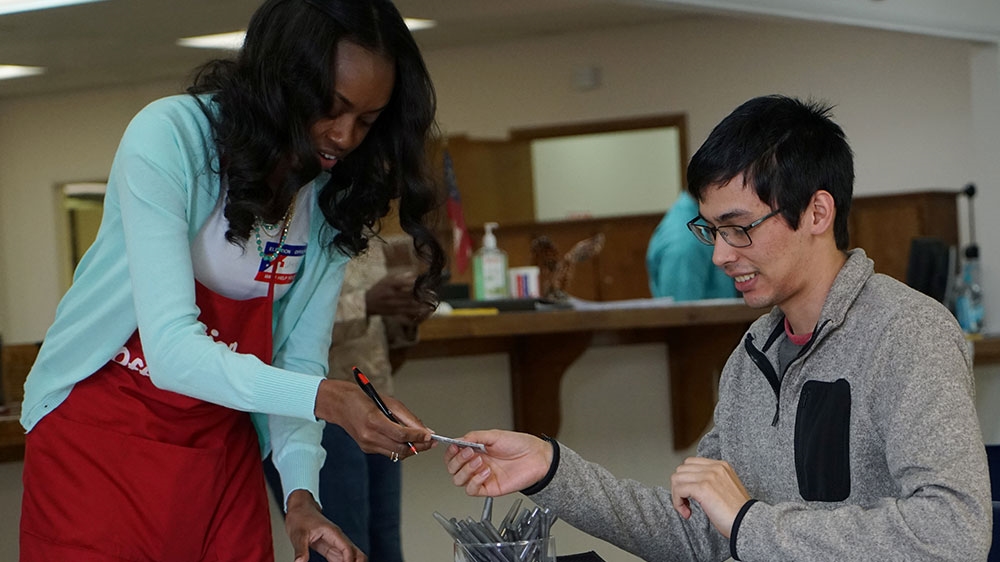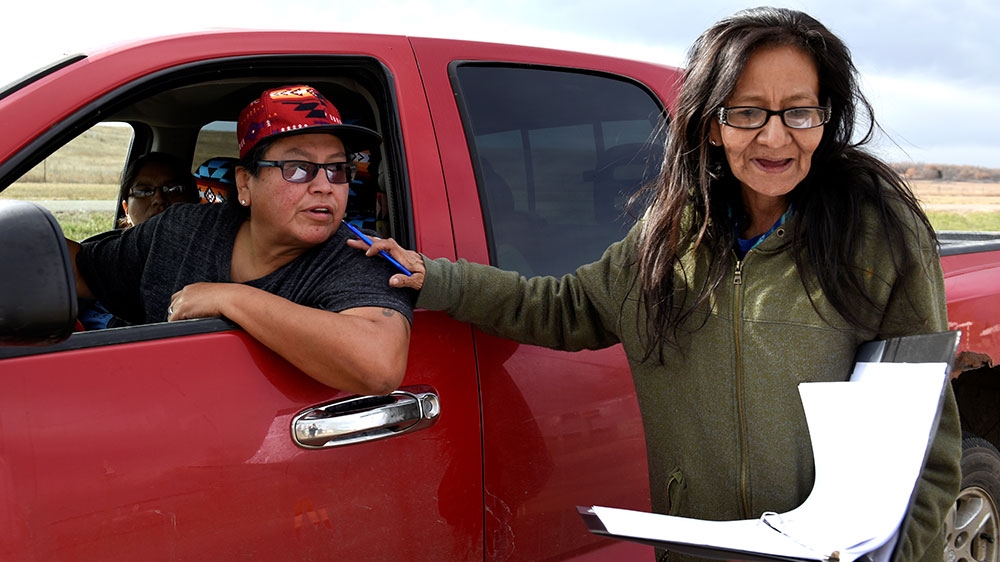US midterms: How widespread is voter suppression?
With less than a week until midterm elections, civil rights groups and voting advocacy organisations in several US states have sounded the alarm on what they call voter suppression.
Although allegations of voter suppression are often made during elections, the claims are now more widespread than normal.
During the upcoming midterm elections, voters will decide 39 state and territorial governorships, all 435 seats in the House of Representatives and 35 of the 100 seats in Senate, among others.
Since 2010, at least 24 US states have introduced new measures that place tight restrictions on voting protocol. Most of those states are controlled by Republicans.
In the last eight years, according to the Brennan Center for Justice, 13 states introduced or tightened restrictive voter ID laws, 11 have laws making it harder for citizens to register, seven cut back on early voting opportunities and three moved to make it more difficult to return voting rights to people with criminal convictions.
In most cases, the measures disproportionately affected voters of colour, who are generally considered more likely to vote Democrat than Republican.
Republican supporters of tightening voter restrictions claim that the measures are necessary to prevent voter fraud, but Democrats and other critics point to evidence that suggests voter fraud is rare in the US.
Al Jazeera examines some of the fears voting rights groups have as Americans head to the polls:
Voter applications stalled, rolls purged: Georgia
In the southern state of Georgia, civil rights groups and advocates have issued a slew of voter suppression accusations.
The accusations are at the centre of the governor’s race, and voting rights advocates tell Al Jazeera that there are concerns over the election’s integrity.
Brian Kemp, Georgia’s secretary of state, is currently running for governor against Stacey Abrams, who hopes to become the nation’s first female African American governor.
As secretary of state, however, Kemp’s office is also in charge of processing voter applications. According to an Associated Press report, his office is stalling 53,000 voter applications, nearly 70 percent of which belong to African Americans.
 |
| A voting official hands back an early voter his ID in Valdosta, Georgia [Lawrence Bryant/Reuters] |
On Tuesday, Abrams lashed out at Kemp on The View, a daytime talk show. “We know he has disproportionately purged voters of colour, stopped voters of colour, arrested voters of colour,” she said.
“Regardless of his intent, the result is that racial bias has been injected into our system, and that undermines confidence.”
The Brennan Center for Justice says the number of voters “purged” skyrocketed under Kemp, reaching an estimated 1.5 million between the 2012 and 2016 elections. That total is nearly twice the number purged between 2008 and 2012, the group said in a report.
“It doesn’t require a science fiction mind to see how this plays out,” Nse Ufot, executive director of the New Georgia Project, told Al Jazeera.
Ex-felons barred from voting: Florida, Kentucky, Iowa
In nearly every US state, convicted felons are not allowed to vote while in prison. Many also have restrictions on individuals on parole.
Voting rights groups estimate that this affects about six million people and disproportionately affects people of colour.
Three states – Florida, Kentucky and Iowa – take the restrictions a step further by barring all citizens with a felony conviction from voting for life, unless the right is restored under a certain set of rules. Virginia also has similar rules, but the governor has promised to restore rights on a rolling basis, according to the Brennan Center.
In Florida, an estimated 1.5 million people who were convicted of felonies will not be able to vote unless they receive a pardon from the state’s governor.
Of that total, it is estimated that roughly one-third are African Americans, leading advocacy groups to lodge allegations that the measure is racist.
The current system was introduced by Governor Rick Scott, who won two gubernatorial races by slim margins and is now running for Senate.
In February, a federal judge ruled that the process by which voting rights are restored violates the US Constitution. An appeals court is not considering the case.
Meanwhile, Florida residents will have the chance to decide on the issue on November 6.
Among several measures on the ballot is an amendment that, if passed, would automatically restore voting rights for felons, except murderers and sex offenders, once they complete their sentence.
The most recent opinion polls show support for the measure, according to the Sun Sentinel newspaper. The paper notes, however, that a ballot measure requires approval from 60 percent of those who vote on the amendment.
With less than a week until Election Day, the Florida gubernatorial race has boiled down to a neck-and-neck face-off between Democrat Andrew Gillum, who could be Florida’s first black governor, and Republican Ron DeSantis.
Gillum supports the ballot measure on voting rights, while DeSantis opposes it.
Limiting Native American votes: North Dakota
In October, state officials introduced a new measure they say was designed to prevent voter fraud in North Dakota.
The new requirement stipulated that voters must have a valid residential address, which presented a problem for thousands of Native Americans living on reservations. Many Native Americans in North Dakota use post office boxes as their official address on the identification cards.
In the lead-up to Election Day, many Native American North Dakotans have scrambled to have their addresses changed on their identification cards in order to be eligible to vote.
In 2012, Democratic Senator Heidi Heitkamp won a narrow upset victory after drawing strong support from North Dakota’s Native American population.
Given that Heitkamp won by less than 3,000 votes and Native Americans are generally far more likely to vote Democrat, the new measure could have an impact on the upcoming midterm results in the state.
Heitkamp, who is running for election, is trailing her Republican challenger, Kevin Cramer.
 |
| Brenda Miller speaks to a voter while canvassing voters in Porcupine, North Dakota before the 2018 midterm elections on the Standing Rock Reservation [Dan Koeck/Reuters] |
On Thursday, a judge denied an emergency request that would have prevented the address requirement from applying to this year’s midterm election.
The judge conceded that “the litany of problems identified in this new lawsuit were clearly predictable and certain to occur,” but he added that issuing a temporary restraining order was “unwarranted given the importance of avoiding further confusion and chaos on the eve of an election.”
Polling site moved or closed: Kansas
The American Civil Liberties Union (ACLU) in Kansas recently objected to the decision of the Ford County Clerk to move Dodge City’s polling site out of the city, which is home to about 13,000 people.
According to the rights group, the new station is located about a half a mile outside the city limits and not accessible by pavement. There is also no public transportation to the location.
On Thursday, a federal judge ruled that the city does not have to open an additional polling station before the midterm elections.
“For the court to insert itself into this process on the eve of the election – by ordering the reopening of the Civic Center either as the only polling location or a second polling location – likely would create more voter confusion than it might cure,” Judge Daniel Crabtree ruled.
“The relief plaintiffs seek is not in the public’s interest.”
According to the ACLU, Kansas has lost more than 100 polling places over the past few years. This comes voter registration numbers grow. The rights group noted that there have been several other complaints of voter suppression in the state, including in Wyandotte County, where one polling site in a neighbourhood with a large Hispanic population, is located in the same building as a police station.
Kansas is ranked among the worst states for voter rights, according to a number of studies. The state requires a valid government-issued photo id in order to vote.
The law was championed by Kris Kobach, Kansas’s current secretary of state, and now a candidate in the gubernatorial race. His race against Democrat Laura Kelly is tight, with polls showing the pair in a dead heat.




